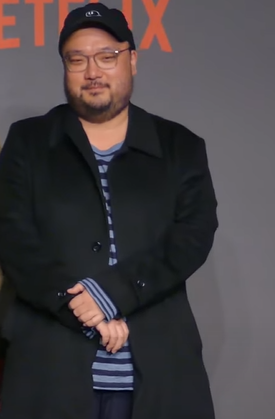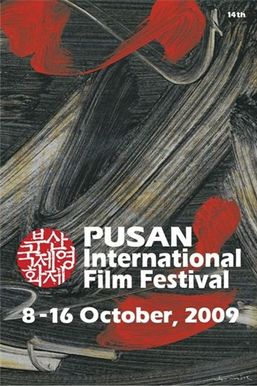Related Research Articles

Kang Hye-jung is a South Korean actress. Making her film debut in arthouse film Nabi (2001), she rose to stardom and critical acclaim in Park Chan-wook's 2003 revenge thriller Oldboy. A rising star early in her career, she gained acting awards for Han Jae-rim's relationship drama Rules of Dating (2005), and Park Kwang-hyun's Korean War comedy Welcome to Dongmakgol (2005).

Jealousy Is My Middle Name is a 2003 South Korean film. It won Best Film honors at the Busan International Film Festival and the Rotterdam Film Festival and was the directorial debut of Park Chan-ok. It was inspired by the poem of the same name by Ki Hyung-do.
Kim Tae-kyun is a South Korean film director. Kim wrote and directed Volcano High (2001) and Temptation of Wolves (2004). He also directed The Adventures of Mrs. Park (1996), First Kiss (1998), A Millionaire's First Love, Crossing (2008), Higanjima (2010), A Barefoot Dream (2010), Innocent Thing (2014), and Bad Sister (2014). Crossing and A Barefoot Dream were selected as the South Korean entries for Best Foreign Language Film at the 81st and 83rd Academy Awards, but both did not make the final shortlist.

Jeon Soo-il is a South Korean film director, film producer and screenwriter. After graduating from the Department of Theatre & Film of Kyungsung University in Busan, he studied Film Direction at Ecole Supérieure de Réalisation Audiovisuelle (E.S.R.A) in France from 1988 to 1992. He completed his master and doctorate degrees in Film Science at the Paris Diderot University in Paris, France. He is currently an associate professor of the Department of Theatre & Film of Kyungsung University and the president of Dongnyuk Film.

Seo Woo is a South Korean actress. She made her breakthrough with the film Crush and Blush (2008). She is best known for her roles in the films Paju and The Housemaid, as well as her roles in the TV dramas Tamra, the Island, Cinderella's Sister and Flames of Desire.

Paju is a 2009 South Korean film. It tells the tale of a teenage schoolgirl and her complex relationship with her older sister’s husband. Set in the city where it takes its name from – a longtime military area and now a developing city located close to the North/South Korean border – its narrative deals with guilt, mystery, love and redemption, as well as the psychological layers of its characters. The film also offers a glimpse into South Korean society and the struggles some residents of Paju face.

Late Autumn is a 2010 English-language film directed by Kim Tae-yong. It stars Tang Wei as Anna, a prisoner who is given a 72 hours parole to visit family in Seattle, and who meets and befriends a South Korean man on-the-run.

Lee Kyoung-mi is a South Korean film director and screenwriter.
Shin Su-won is a South Korean film director and screenwriter. Shin wrote and directed Passerby #3 (2010), Pluto (2013) and Madonna (2015). Her short film Circle Line won the Canal+ Prize for Best Short Film at the 2012 Cannes Film Festival.

Yim Pil-sung is a South Korean film director and screenwriter. He wrote and directed Antarctic Journal (2005), Hansel and Gretel (2007), and Scarlet Innocence (2014).

Yim Soon-rye is a South Korean film director and screenwriter. She is considered one of the few leading female auteurs of Korean New Wave cinema.

Lee Hae-jun is a South Korean film director and screenwriter. He wrote and directed Like a Virgin (2006), Castaway on the Moon (2009), and My Dictator (2014).
Yoon Jong-chan is a South Korean film director. He directed Sorum (2001), Blue Swallow (2005), I Am Happy (2009) and My Paparotti (2013).
Zhang Lü is a Chinese filmmaker. Zhang was originally a novelist before embarking on a career in cinema. His arthouse films have mostly focused on the disenfranchised, particularly ethnic Koreans living in China; these include Grain in Ear (2006), Desert Dream (2007), Dooman River (2011), Scenery (2013), and Gyeongju (2014).
Cho Chang-ho is a South Korean film director and screenwriter. Cho wrote and directed The Peter Pan Formula (2006) and Lovers Vanished (2010).
O Muel is a South Korean film director and screenwriter. He wrote and directed the award-winning film Jiseul in 2012.
Park Jung-bum is a South Korean film director, screenwriter and actor. Park wrote, directed, and acted in his directorial debut The Journals of Musan (2011), which won the New Currents Award and FIPRESCI Award at the 15th Busan International Film Festival, Golden Star at the 10th Marrakech International Film Festival, Tiger Award at the 39th International Film Festival Rotterdam, Grand Prize and Young Critics Award at the 47th Pesaro International Film Festival, Jury Prize at the 13th Deauville Asian Film Festival, and more - a total of 17 awards were won at major film festivals around the world since it premiered at the Busan International Film Festival in 2010.
Hong Seok-jae is a South Korean film director and screenwriter. Hong wrote and directed his thriller feature debut Socialphobia (2015), which won the NETPAC Award and DGK Award for Best Director at the 19th Busan International Film Festival in 2014, and the Best New Director and Best New Actor at the 24th Buil Film Awards in 2015. His short film Keep Quiet (2011) won the Special Jury Prize and I love Shorts! Audience Award at the Mise-en-scène Short Film Festival in 2012.
Jang Kun-jae is a South Korean film director, screenwriter and cinematographer. Jang debuted with Eighteen (2010) which won the grand prize win as part of the 2009 Vancouver International Film Festival's Dragons and Tigers Award. His second feature Sleepless Night (2013) picked up JJ-Star Award and JIFF Audience Award at the 2012 Jeonju International Film Festival. His third feature A Midsummer's Fantasia (2015) received several nominations, including Best Director and Best Screenplay at the 3rd Wildflower Film Awards.

The 14th Busan International Film Festival was held from October 8 to October 16, 2009, in Busan, South Korea.
References
- ↑ "To Be". IndieStory. Retrieved 2015-05-07.
- ↑ "Jealousy Is My Middle Name". International Film Festival Rotterdam . Archived from the original on 2014-12-29. Retrieved 2015-05-07.
- ↑ Elley, Derek (29 November 2002). "Review: Jealousy Is My Middle Name". Variety . Retrieved 2015-05-07.
- ↑ "PARK Chan-ok". Korean Film Biz Zone. Retrieved 2015-05-07.
- ↑ "Warm Swamp / Jambok". 12th International Women's Film Festival in Seoul . Archived from the original on 2015-05-18. Retrieved 2015-05-07.
- ↑ "PIFF: Korean, Thai Directors Win Top PPP Prize". The Korea Times via Hancinema . 12 October 2005. Retrieved 2015-05-07.
- ↑ Park, Soo-mee (10 October 2009). "Pusan a sophomore curse, blessing". The Hollywood Reporter . Retrieved 2015-05-07.
- ↑ Park, Sun-young (22 October 2009). "Six filmmakers confront the struggle of the second time". Korea JoongAng Daily . Archived from the original on January 27, 2013. Retrieved 2015-05-07.
{{cite web}}: CS1 maint: unfit URL (link) - ↑ Oxenbridge, David (1 October 2009). "PARK Chan-ok's Long Awaited Paju Screens at Pusan". Korean Film Biz Zone. Retrieved 2015-05-07.
- ↑ Kim, Lynn (16 October 2009). "Korean film Paju wins NETPAC Award at PIFF". 10Asia. Retrieved 2015-05-07.
- ↑ D'Sa, Nigel (22 October 2009). "14th PIFF Wraps With Awards". Korean Film Biz Zone. Retrieved 2015-05-07.
- ↑ "Tribeca '10: Haunting Love on the Lam: Park Chan-ok's Paju (World Narrative Competition)". Indiewire . 14 April 2010. Retrieved 2015-05-07.
- ↑ Park, Sun-young (16 October 2009). "An illicit love affair mixed with mystery". Korea JoongAng Daily . Archived from the original on January 27, 2013. Retrieved 2015-05-07.
{{cite web}}: CS1 maint: unfit URL (link) - ↑ Shin, Hae-in (22 October 2009). "(Movie Review) Paju examines female psyche through forbidden love, social disorder". Yonhap . Retrieved 2015-05-07.
- ↑ Paquet, Darcy (12 October 2009). "Paju". Screen International . Retrieved 2015-05-07.
- ↑ Edwards, Russell (19 October 2009). "Review: Paju". Variety . Retrieved 2015-05-07.
- ↑ D'Sa, Nigel (22 October 2009). "Paju To Be Released Oct 29". Korean Film Biz Zone. Retrieved 2015-05-07.
- ↑ Shin, Hae-in (13 November 2009). "S. Korea's Paju to open Dutch film fest". Yonhap . Retrieved 2015-05-07.
- ↑ Mundell, Ian (28 January 2010). "Paju opens Rotterdam". Variety . Retrieved 2015-05-07.
- ↑ Chanoine, Xavier; Wons, Yoann (12 March 2010). "Interview Park Chan-Ok". Cinemasie (in French). Retrieved 2015-05-07.
- ↑ "Korea's Park Chan-ok Wins APSA NETPAC Prize". Asia Pacific Screen Awards . 1 December 2010. Archived from the original on 23 September 2015. Retrieved 2015-05-07.
- ↑ Hong, Lucia (2 December 2010). "Director of Korean film Paju wins award at film fest in Australia". 10Asia. Retrieved 2015-05-07.
- ↑ Garcia, Cathy Rose A. (15 December 2009). "Park Chan-ok Named Female Director of Year". The Korea Times . Retrieved 2015-05-07.
- ↑ Ko, Kyoung-seok (16 December 2009). "Dir. Park Chan-ok named top female film figure of year". 10Asia. Retrieved 2015-05-07.
- ↑ "Park Chan-ok Named Female Filmmaker of 2009". The Chosun Ilbo . 17 December 2009. Retrieved 2015-05-07.
- ↑ D'Sa, Nigel (24 December 2009). "PARK Chan-ok Named Best Femme Filmmaker". Korean Film Biz Zone. Retrieved 2015-05-07.